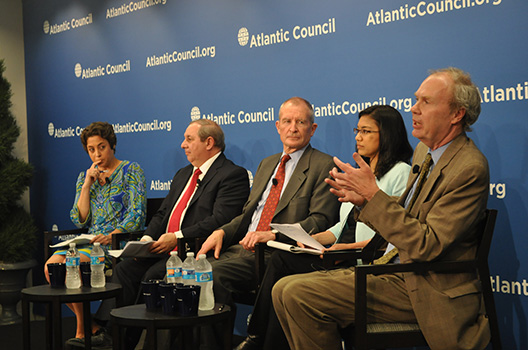 The past eight years have marked the longest period of reported deterioration in democracy since Freedom House began tracking such issues in 1972. It is with this concerning development in mind, be it a dangerous trend or merely an alarming blip in history, that the Atlantic Council convened a diverse group of experts to recognize the release of its latest publication, Is Authoritarianism Staging a Comeback?, and hosted a public discussion on the state of authoritarianism and civil resistance.
The past eight years have marked the longest period of reported deterioration in democracy since Freedom House began tracking such issues in 1972. It is with this concerning development in mind, be it a dangerous trend or merely an alarming blip in history, that the Atlantic Council convened a diverse group of experts to recognize the release of its latest publication, Is Authoritarianism Staging a Comeback?, and hosted a public discussion on the state of authoritarianism and civil resistance.
This event comprised two panel discussions. The first panel, featuring Dr. Peter Ackerman, Founding Chair at the International Center on Nonviolent Conflict, Dr. Paula Dobriansky, Senior Fellow with the Future of Diplomacy Project at Harvard University’s Belfer Center for Science and International Affairs, and Mr. Damon Wilson, Executive Vice President of the Atlantic Council, and moderated by Atlantic Council President and CEO Mr. Frederick Kempe, broadly interrogated the question of whether authoritarianism was in fact staging a comeback. While the consensus was that authoritarianism was indeed staging a comeback, the discussion quickly turned to the question of whether that comeback will prove sustainable and how US policymakers should be responding.
Panel members agreed that the sustainability of authoritarianism’s recent gains will largely depend on the strength of civil resistance movements. However, there is a gap in understanding amongst policymakers as to how these movements in foreign nations directly impact national security and how to best support them. Dr. Ackerman observed that policymakers’ strong inhibition towards regime change and the perception that civil resistance movements occur spontaneously have prevented us from recognizing the skills needed for effective resistance. It is a skills-based activity that presents valuable policy opportunities for US decision makers. Dr. Dobriansky echoed this sentiment, and encouraged US policymakers to step up and provide resistance movements with the kind of support they are actually looking for.
Mr. Wilson built on these points by arguing that the United States and its allies lacked not only an understanding of how to counter authoritarianism and promote democracy, but also the willpower to defend their values and norms. He thus encouraged policymakers to avoid “overlearning” the lessons of Iraq and to appreciate that democracy should play a significant role in America’s national security strategy.
After this enlightening analysis of the broad status of authoritarianism and US policy options, the second panel focused the discussion on the more specific contents of the Atlantic Council’s latest book. This panel was made up of a selection of the book’s authors, including Admiral Dennis Blair, Chairman of the Board at the Sasakawa Peace Foundation, Dr. Regine Spector, Assistant Professor in the Department of Political Science at the University of Massachusetts at Amherst, and Dr. George Lopez, Vice President of the Academy for International Conflict Management and Peacebuilding at the United States Institute of Peace. This panel was moderated by Dr. Maria Stephan and Dr. Mathew Burrows, Nonresident Senior Fellow and Director, respectively, of the Atlantic Council’s Strategic Foresight Initiative.
Dr. Spector began the discussion by elaborating on her chapter on authoritarian resilience in Central Asia. Dr. Spector argued that the relative resilience of authoritarianism in this region was the product of “adaptable autocrats,” which she explained in terms of five specific “pillars of authoritarianism.” By contrast, Dr. Lopez focused on the value of smart sanctions as a policy option for shaping behavior in authoritarian regimes, arguing that sanctions were an underused tool for shifting pressure points in authoritarian governments and civil societies. Finally, Admiral Blair elaborated on his chapter about the potential for the United States and allied militaries to influence the attitudes and behaviors of non-democracies.
All in all, the session wrapped the first year of the Future of Authoritarianism Project and set the stage for the second year to focus more on national security strategy and the role of policymakers in regards to civil resistance.
More details about the book, Is Authoritarianism Staging a Comeback?, including contributing authors, reviews, and purchase information, can be found here.
